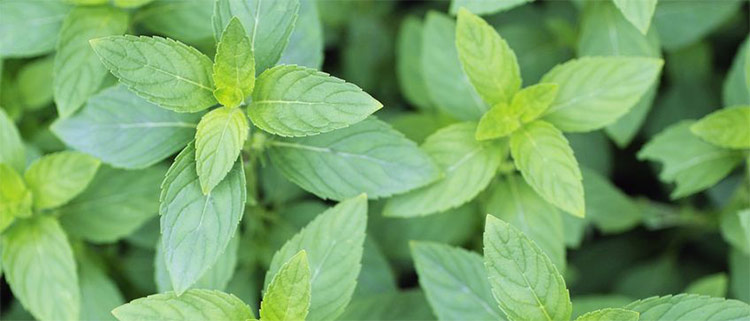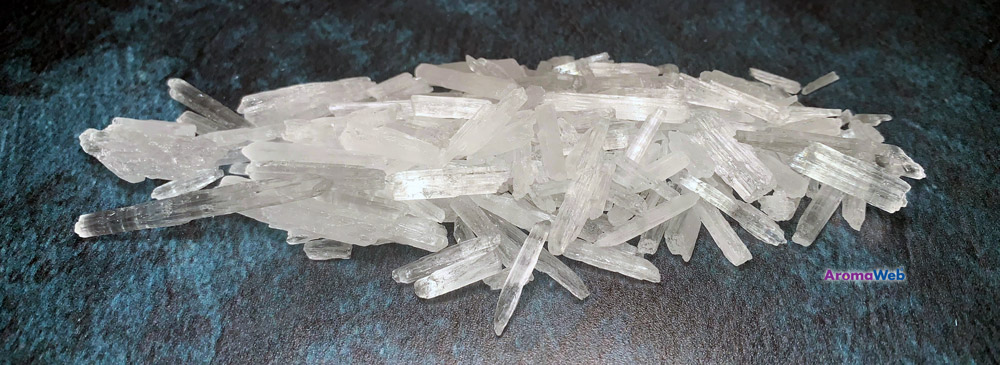Cornmint Essential Oil
Mentha arvensis

Description
Steam Distilled Cornmint Essential Oil is somewhat similar in aroma and application to that of Peppermint Essential Oil. However, read on for important differences.
Menthol is the component that gives Peppermint and Cornmint Essential Oils their ability to make the areas of application feel cooler or fresher. Spearmint Essential Oil has far less menthol than that of Peppermint or Cornmint.
Menthol doesn't actually cool the skin, but it changes our perception so that we think that the area of application is cooler. [Source: Wikipedia. Accessed: November 5, 2023.]
Cornmint Essential Oil that has not been dementholized can contain up to 80% menthol. In comparison, Peppermint Essential Oil and dementholized Cornmint Essential Oil tends to have a menthol composition that ranges between 30-50%.
Dementholized Cornmint Essential Oil is sometimes passed off as Peppermint Oil, so it is important to be careful of where you procure your oil.
Most Cornmint Oil has been fractionated (dementholized) to remove a large percentage of the menthol. The menthol crystals fractionated from Cornmint Essential Oil are used by personal care manufacturers for use in massage formulations, pain relief blends and other applications that call for menthol.
Pure menthol forms beautiful crystals that are somewhat similar in appearance to that of quartz. Cornmint Essential Oil that has not been dementholized can crystalize at cooler temperatures. If you refrigerate your essential oils (recommended), it's best to allow your Cornmint Essential Oil to warm up before trying to use it.
Therefore, it's especially important to check the GC/MS report and seller's description to learn what the menthol composition is of the Cornmint Essential Oil that you are considering purchasing.

Shown above are pure menthol crystals from Cornmint Essential Oil.
Cornmint Essential Oil is not as widely used within the scope of holistic aromatherapy. Peppermint Essential Oil is preferred for aromatherapy applications.
Within fragrancing, soapmaking and other applications, however, Cornmint can be a practical substitute for Peppermint Essential Oil due to its lower cost.
Cornmint Essential Oil Benefits and Uses
It's potential applications are similar to those of Peppermint Oil.
Botanical Name

Plant Family
Common Method of Extraction
Steam Distilled
Plant Part Typically Used
Color
Clear
Consistency
Thin. Cornmint Essential Oil that has a large concentration of menthol can crystalize, particularlly at cold temperatures.
Perfumery Note
Top
Strength of Initial Aroma
Strong
Aromatic Description
Cornmint Essential Oil smells very minty and menthol-like in aroma. Depending on the source and level of dementholization, it can have a much more potent aroma than Peppermint Oil.
Sustainability and Conservation Status
Least Concern
Source: https://www.iucnredlist.org/species/64317970/67730082
To learn more about the conservation status of essential oil bearing plants and how to use the IUCN Red List of Threatened Species, please refer to AromaWeb's Guide to Essential Oils and Sustainability.
Major Constituents
- Menthol
- Menthone
- Isomenthone
- Limonene
- Pinene
See Essential Oil Safety for a more complete list of typical constituents.
Source: K.H. Kubeczka, Essential Oils Analysis by Capillary Gas Chromatography and Carbon-13 NMR Spectoroscopy, Second Edition. (Chichester: Wiley, 2002). Source cited in Robert Tisserand and Rodney Young, Essential Oil Safety (Second Edition. United Kingdom: Churchill Livingstone Elsevier, 2014), 261.
Cornmint Essential Oil Safety Information
Tisserand and Young indicate that it is contraindicated in instances of cardiac fibrillation and G6PD deficiency. They precaution against using it topically near the face of children and infants. Cornmint Oil may act as a choloretic. [Robert Tisserand and Rodney Young, Essential Oil Safety (Second Edition. United Kingdom: Churchill Livingstone Elsevier, 2014), 261.]
General Safety Information
Do not take any oils internally and do not apply undiluted essential oils, absolutes, CO2s or other concentrated essences onto the skin without advanced essential oil knowledge or consultation from a qualified aromatherapy practitioner. For general dilution information, read AromaWeb's Guide to Diluting Essential Oils. If you are pregnant, epileptic, have liver damage, have cancer, or have any other medical problem, use oils only under the proper guidance of a qualified aromatherapy practitioner. Use extreme caution when using oils with children and be sure to first read the recommended dilution ratios for children. Consult a qualified aromatherapy practitioner before using oils with children, the elderly, if you have medical issues or are taking medications. Before using this or any essential oil, carefully read AromaWeb's Essential Oil Safety Information page. For in-depth information on oil safety issues, read Essential Oil Safety by Robert Tisserand and Rodney Young.
Shelf Life
Important Information About the Profiles
The essential oil information provided on AromaWeb is intended for basic educational purposes only. The references to safety information, test results, constituents and percentages is generalized information. Essential oils can vary greatly in composition. The data is not necessary complete and is not guaranteed to be accurate. The essential oil photos are intended to represent the typical and approximate color of each essential oil. However, essential oil composition and color can vary based on harvesting, distillation, age of the essential oil and other factors. Profiles for several CO2 Extracts and absolutes are included within the directory, and are denoted as such.
